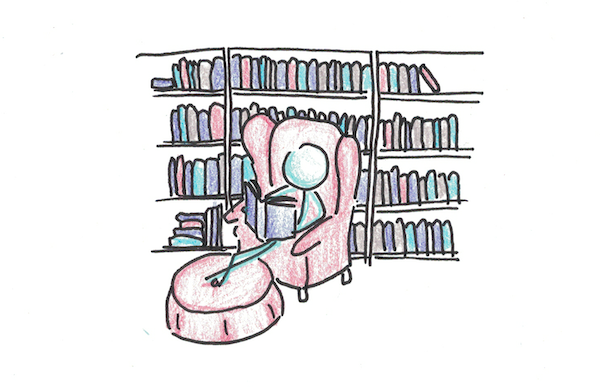
“If you only put into action half of what you read, you’d already be a millionaire.”
I’ve heard many variations of this advice, all making the point that the problem isn’t that we don’t have good ideas, but that we implement little of it and therefore our lives don’t change, we don’t lose weight, grow wealth, improve our relationships or become happier.
The implication of this advice is that if you read a book and don’t apply it, you’ve just wasted your money. You ought to apply the lessons of what you read, or there was no point reading the book. I disagree.
Why You Ought to Read More Advice than You Actually Use
Reading books is cheap. Kindle editions of popular books cost less than a nice meal. Libraries and borrowing books means you often don’t even need to pay that.
Even the time spent to read a book is a fairly low investment. For almost any topics there are books which are good enough that reading them isn’t a chore. If you get in the habit you can probably easily read two dozen books a year.
Implementing ideas, in contrast, is often quite expensive. Implementing just one idea from a book can take more time, money or effort than reading the book itself. Implementing all the ideas from a single book might take years.
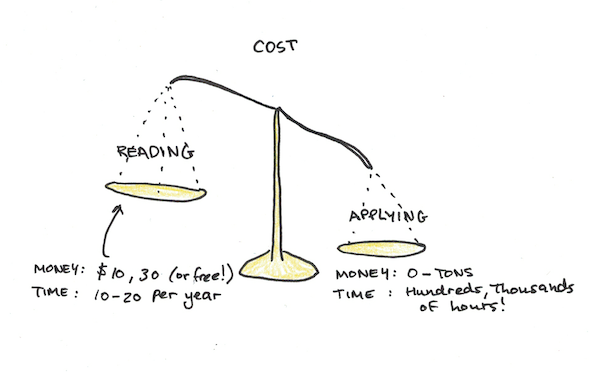
This imbalance suggests that you ought to read a ton of books, and only implement a fraction of the ideas, depending on what you have time for.
If the Typical Book Changes Your Life You Read Far Too Few Books
An idea from economics you should remember deeply is that when you have diminishing returns from an activity (meaning doing more and more gets less effective), then the optimal amount is when marginal cost equals marginal benefit.
To illustrate, imagine a machine that you put in $5 and it spits out money each time. At first it spits out $20 bills. After a while, only $10 bills come out. Eventually only few quarters spit out when you put in your $5. When should you stop using the machine?
Obviously, you should stop using the machine when it only gives you $5 back. That’s when marginal benefit (the amount of money you get each time) is equal to marginal cost (the amount you have to put in to run the machine).
Now apply this reasoning to books. If a typical book you read costs $20 and requires twenty hours to read, but the value is life changing—you’re not reading enough books! You should keep putting in those $20 and twenty hours until books you read are worth about what you paid for them. Any less and you’re leaving money on the table.
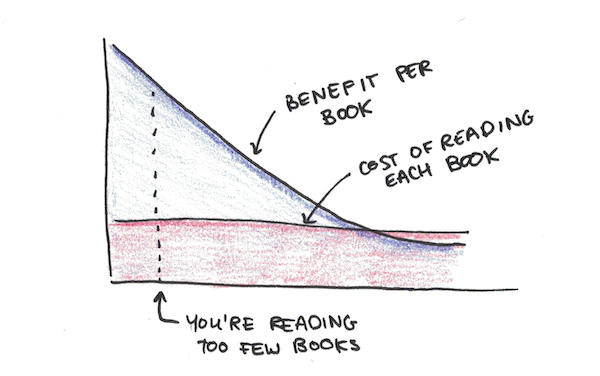
I think the vast majority of people don’t read enough books to reach this trade-off point. So the advice to read less until you implement every idea you’ve already read seems foolishly wasteful to me.
Why Unused Books Still Have Value
Contrary to the popular wisdom, I think a book you never explicitly try to implement can still add value. Perhaps not life-changing, but at the very least, enough value to justify the relatively low cost invested in them.
It’s true, most books won’t change your life. But then again, you don’t need a life-changing amount of money and time to consume them. If you pick good books, read them well and think deeply about their implications, that’s enough to earn back their price tag (both in terms of dollars and hours spent).
There’s a few ways books have a lot of value, even if you don’t make a direct habit of implementing every idea:
1. Good books limit bad choices.
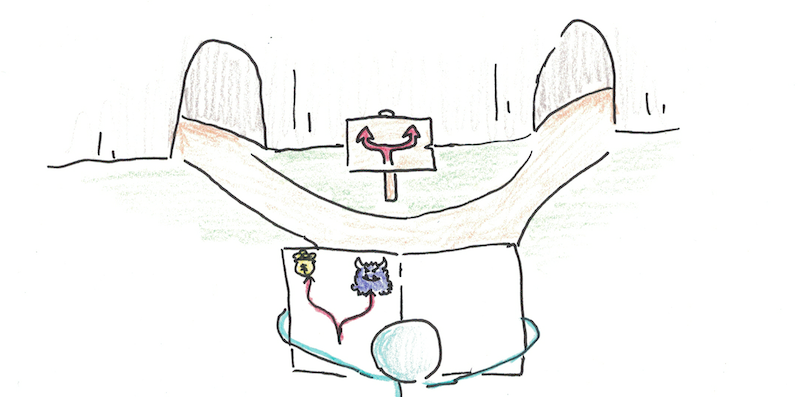
Read enough books about investing and you learn enough to steer away from some clearly bad habits on investing. Yes, the nth book you read may not cause you to change any behavior differently from the n-1 books you read before, but the accumulation of books on personal finance can keep you from spending and saving foolishly.
It’s often the things you don’t do after reading a book that justify the investment cost. If a book steers you away from bad strategies which won’t work, that alone can make it worth reading.
2. Reading a lot ensures you have lots of good ideas.

The improvements I want to make in my own life and business often resemble a huge (near infinite) list of things I could be doing. I could refine my exercise habits, optimize a landing page, switch to a new productivity app, etc..
The list is usually far larger than I have time to accomplish. That’s okay. What reading a lot of books does is that it increases the overall quality of this list, so that the ideas I’m working on are better. The more you read, the better the average quality of your list, even if you haven’t set aside time to work on any specific idea.
3. Books change the conversation in your head.
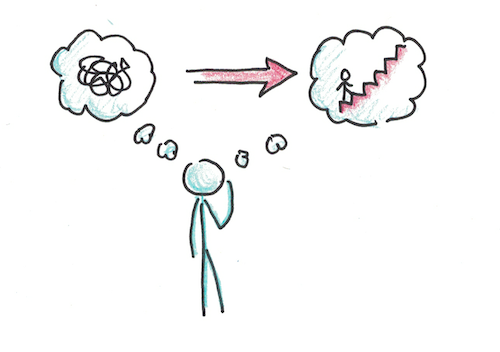
Good books don’t simply act as an instruction manual, giving you a tutorial for changing something specific. Instead, they shift the conversation in your head. Read a good book, and you’ll start thinking about things in a different way.
Sometimes that different pattern of thinking will result in some deliberate plans of action. Other times, they will merely adjust your thinking down a new direction you might not have considered before.
4. Authors can be the friends in your life you wish you had.
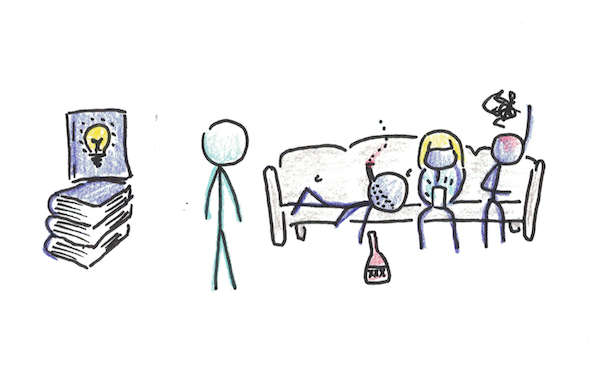
If you have one friend who is always perfect—never procrastinates, achieves every goal she sets, eats healthy and has good habits—that probably won’t make you a better person on its own. (In fact, this person sounds pretty annoying.) However, if all your friends acted that way—you couldn’t help but change your behavior.
Books, in some ways, can act like a thumb on the scale of your average social environment. They may not be the same as flesh and blood people motivating you to act, but they subtly adjust your expectations for yourself.
When I started reading books, I found they gave me motivation to do a lot of things that people around me thought were “weird” even though those things eventually led to a lot of good things in my life. If I had tried to implement those ideas spontaneously off of a single book, the impact probably wouldn’t be sustainable.
5. Sometimes, books really do change your life.
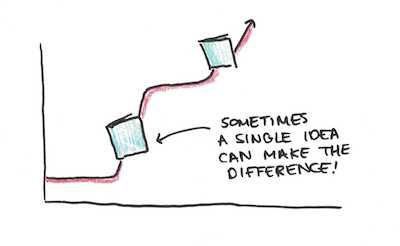
Although, on average, most books you read won’t change your life (and if they do, you’re not reading nearly enough books), some books certainly will. Every once in awhile, you’ll encounter a book that will give you just the right idea at the right time and inspire you to make a bunch of sweeping changes.
In this sense, buying books is like buying lottery tickets, each with a small chance of a huge payoff. Lottery tickets tend to be a bad investment because, cheap as they are, the chance of winning is even lower. Good books, on the other hand, are a great one because they’re both cheap and if you read enough, there’s bound to be a few that will change your life.
Want some good books to read? Check out my book club podcast playlist, where I’ve covered some of my favorite in-depth.


 I'm a Wall Street Journal bestselling author, podcast host, computer programmer and an avid reader. Since 2006, I've published weekly essays on this website to help people like you learn and think better. My work has been featured in The New York Times, BBC, TEDx, Pocket, Business Insider and more. I don't promise I have all the answers, just a place to start.
I'm a Wall Street Journal bestselling author, podcast host, computer programmer and an avid reader. Since 2006, I've published weekly essays on this website to help people like you learn and think better. My work has been featured in The New York Times, BBC, TEDx, Pocket, Business Insider and more. I don't promise I have all the answers, just a place to start.